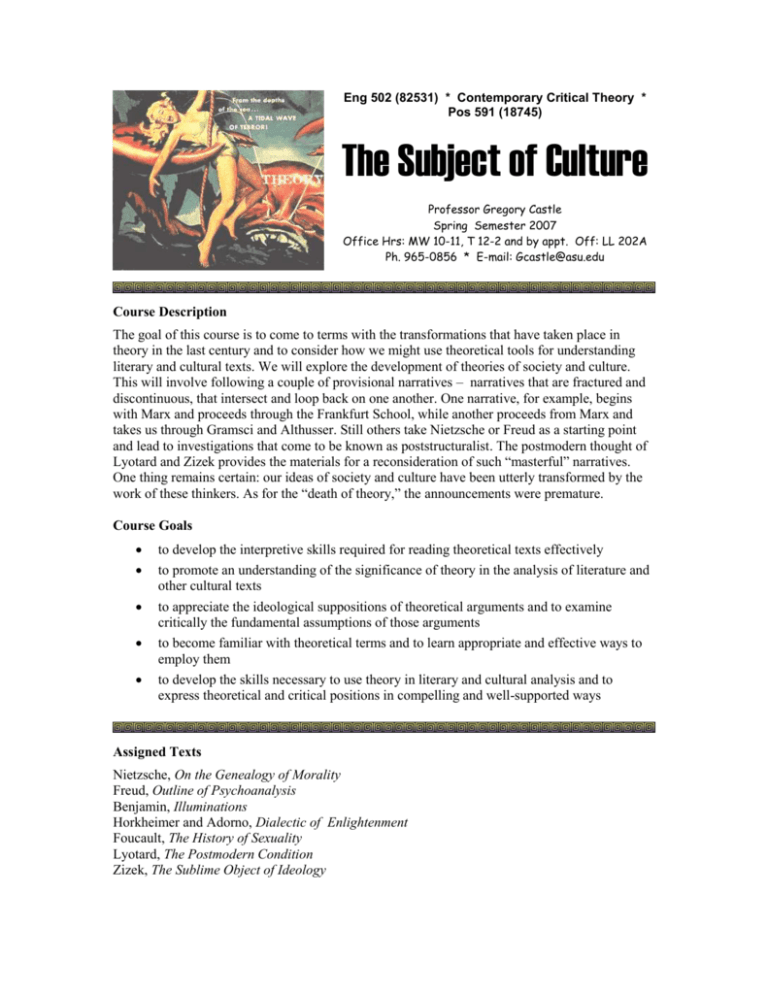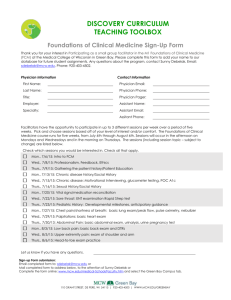Eng 502 Theories of Society and Culture (syllabus)
advertisement

Eng 502 (82531) * Contemporary Critical Theory * Pos 591 (18745) The Subject of Culture Professor Gregory Castle Spring Semester 2007 Office Hrs: MW 10-11, T 12-2 and by appt. Off: LL 202A Ph. 965-0856 * E-mail: Gcastle@asu.edu Course Description The goal of this course is to come to terms with the transformations that have taken place in theory in the last century and to consider how we might use theoretical tools for understanding literary and cultural texts. We will explore the development of theories of society and culture. This will involve following a couple of provisional narratives – narratives that are fractured and discontinuous, that intersect and loop back on one another. One narrative, for example, begins with Marx and proceeds through the Frankfurt School, while another proceeds from Marx and takes us through Gramsci and Althusser. Still others take Nietzsche or Freud as a starting point and lead to investigations that come to be known as poststructuralist. The postmodern thought of Lyotard and Zizek provides the materials for a reconsideration of such “masterful” narratives. One thing remains certain: our ideas of society and culture have been utterly transformed by the work of these thinkers. As for the “death of theory,” the announcements were premature. Course Goals to develop the interpretive skills required for reading theoretical texts effectively to promote an understanding of the significance of theory in the analysis of literature and other cultural texts to appreciate the ideological suppositions of theoretical arguments and to examine critically the fundamental assumptions of those arguments to become familiar with theoretical terms and to learn appropriate and effective ways to employ them to develop the skills necessary to use theory in literary and cultural analysis and to express theoretical and critical positions in compelling and well-supported ways Assigned Texts Nietzsche, On the Genealogy of Morality Freud, Outline of Psychoanalysis Benjamin, Illuminations Horkheimer and Adorno, Dialectic of Enlightenment Foucault, The History of Sexuality Lyotard, The Postmodern Condition Zizek, The Sublime Object of Ideology COURSE REQUIREMENTS Paper one Paper two Paper three Class participation 10% 30% 50% 10% The main requirements for the course are three papers. Paper one (2-3pp) will entail a response to Benjamin or Adorno; paper two (5pp; ) will focus on a comparative discussion of the theorists discussed through week 11; paper three (8-10pp) will be an extended analysis of a theoretical topic (including theoretical readings of literary and cultural texts) to be worked out in conference with the instructor. Please Note: Paper three must incorporate secondary materials on the theorist(s) or text(s) you discuss. There is no hard and fast rule as to the number of courses, but I would expect to see at least 3 sources in addition to those assigned in the class. Acceptable sources include essays in scholarly journals, essays in edited volumes, and chapters in monographs. No internet sources will be accepted, except for sites like Project Muse and JSTOR, which function as electronic archives for print journals, and the Johns Hopkins Guide to Literary Theory and Criticism (http://litguide.press.jhu.edu/) which may be used in your papers, but cannot count as one of your principle sources in the third paper. All papers should be word-processed, 12pt. type, standard margins. Hard copies only; no electronic files please. Policy on late papers: 5% deducted per calendar day (including weekends). After 5 days, papers will not be accepted. Missed assignments, and papers turned in after 5 days, may result in a failing course grade. For more information about paper format and construction, citation guidelines and matters of style, consult the ASU Guide to Style (available online, see link on Blackboard, under Course Documents, external links). Attendance and Class Decorum. Attendance, of course, is mandatory. Anything beyond three (3) absences (i.e., 10% of total course hours) may result in a grade penalty. Excused absences beyond this limit must be documented. Excessive absence (i.e., more than 20% of total course hours) may result in a failing course grade. Excessive tardiness may have the same effect. All students are expected to conduct themselves in a manner befitting a college classroom. Please do not use cellphones, ipods and other electronic devices during class. Laptop computers are permitted, but for notetaking purposes only; students engaged in computer activities unrelated to the class will be asked to leave and marked absent. Please refrain from leaving the classroom during class unless it is an emergency; such behavior is disruptive and disrespectful. All students are expected to bring the assigned texts to class, to take notes and to participate in class discussion. Plagiarism. Plagiarism will not be tolerated. Study carefully the section on plagiarism in The ASU Department of English Style Sheet. If you are still not clear on the subject, if you still don’t know the difference between receiving help and committing plagiarism, see me. Disciplinary action can range from a failing grade to suspension from the University. Please keep in mind that transcripts can now indicate when plagiarism has led to a failing grade. COURSE SCHEDULE Week 1 Mon Wed Jan 15 Jan 17 MLK Holiday Course Introduction Week 2 Mon Jan 22 Wed Jan 24 Marx, from Communist Manifesto (Blackboard) Williams, from Marxism and Literature (Blackboard) Gramsci, from The Prison Notebooks (Blackboard) Benjamin, Illuminations, “Theses on the Philosophy of History”; Recommended: Introduction, by Hannah Arendt Week 3 Mon Jan 29 Wed Jan 31 Week 4 Mon Feb 5 Wed Feb 7 Week 5 Mon Feb 12 Wed Feb 14 Horkheimer and Adorno, Dialectic of Enlightenment, “Excursus I” and “The Culture Industry” Horkheimer and Adorno, Dialectic of Enlightenment, “The Culture Industry” and “Elements of Anti-Semitism” First paper due Week 6 Mon Wed Feb 19 Feb 21 Nietzsche, On the Genealogy of Morality, First Treatise Nietzsche, On the Genealogy of Morality, Second Treatise Week 7 Mon Wed Feb 26 Feb 28 Nietzsche, On the Genealogy of Morality, Third Treatise Freud, Outline of Psychoanalysis Week 8 Mon Wed Mar 5 Mar 7 Freud, Outline of Psychoanalysis Freud, Outline of Psychoanalysis Benjamin, Illuminations, “Unpacking my Library” and “The Storyteller” Benjamin, Illuminations, “Franz Kafka”, “Some Reflections on Kafka” and “Some Motifs on Baudelaire” Benjamin, Illuminations, “Some Motifs on Baudelaire” and “The Work of Art in the Age of Mechanical Reproduction” Horkheimer and Adorno, Dialectic of Enlightenment, “The Concept of Enlightenment”; Recommended: Editor’s Afterword Spring Break March 11-18 Week 9 Mon Mar 19 Wed Mar 21 Britton, “Structuralist and Post-Structuralist Psychoanalytic and Marxist Theories”(Blackboard) Lacan, “Mirror Stage,” “Signification of the Phallus” Irigaray, “Così Fan Tutti” Week 10 Mon Mar 26 Wed Mar 28 Week 11 Mon Apr 2 Wed Apr 4 Week 12 Mon Wed Apr 9 Apr 11 Foucault, The History of Sexuality Habermas, “Modernity versus Postmodernity” Lyotard, The Postmodern Condition Week 13 Mon Wed Apr 16 Apr 18 Lyotard, The Postmodern Condition No class Week 14 Mon Wed Apr 23 Apr 25 Zizek, The Sublime Object of Ideology, “The Symptom” Zizek, The Sublime Object of Ideology, “Lack in the Other” Week 15 Mon Wed Mon Apr 30 May 2 May 7 Zizek, The Sublime Object of Ideology, “The Subject” Reading Day Final paper due (no extensions, no exceptions) Derrida, “Structure, Sign and Play” Barthes, “From Work to Text” Butler, from Gender Trouble Foucault, The History of Sexuality Second paper due Foucault, The History of Sexuality Course Withdrawal Deadline Mar 30/Apr 1 * Complete Withdrawal Deadline May 1






